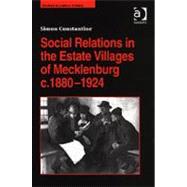Social Relations in the Estate Villages of Mecklenburg c.1880û1924
, by Constantine,Simon- ISBN: 9780754655039 | 0754655032
- Cover: Hardcover
- Copyright: 9/28/2007
The geographical mobility in the European labour-market today is not unprecedented. In the decades before World War One cross-border economic migration, commuting, and job-switching were all common-place. Nowhere was this more true than in the German states of Mecklenburg-Schwerin and Mecklenburg Strelitz. Here estate owners preferred to hire large numbers of the male and female workforce on a seasonal basis, employing workers from local peasant villages, and importing foreign migrant labourers from Russian-Poland during planting and harvesting. In order to keep poor relief costs low, employers also kept most of the core workforce on short-term annual contracts. This book follows this extremely dynamic society through the upheaval of rural-urban migration and seasonalization, the catastrophe of World War One, and the post-war political and economic crises. It examines how employers managed such a heterogeneous and unstable workforce. Using source material left by the workers themselves, it also focuses on the relationship between the different groups of labour, and on the strategies that they adopted in their relations with management. Research on late nineteenth and early twentieth century German society has concentrated overwhelmingly on life in the cities. By contrast, and despite the fact that almost one third of Germans were still working in agriculture as late as 1914, Germany's rural society remains relatively unexplored. Although historians have begun to correct this imbalance, very few full-length studies of social relations east of the Elba in this period have been published.This book concentrates on social relations in the 1,500 estate villages (Gutsdörfer) of Mecklenburg-Schwerin and Mecklenburg-Strelitz. 'Social relations' include the chains of command and obedience, the relative legal positions of owner and workers, contractual-relations, economic relations; the mutual economic dependency of estate owners and workforce, as well as the value systems of owners and labourers which informed these relationships.With its focus on both rural elites and workers, this study differs from much other work on rural Germany. For while a number of historians have examined the rural elites, few have chosen to investigate the lower strata of rural society. This book makes use of overlooked autobiographical accounts, statements given by workers at labour exchanges and before military authorities, as well as confiscated letters, jokes and anecdotes to provide greater insight into the perspective of rural workers.Contents: Introduction; The estate village population; Keeping workers working: management and resident labour; Mismanagement and labour protest; Worker-peasants and urban recruits: labour mobility between the village and the city; Polish seasonal workers; Conclusion; Bibliography; Index.About the Author: Simon Constantine is a lecturer at the University of Wolverhampton, UK.







